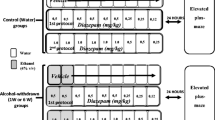Abstract
The purpose of the present experiment was to study the “kindling” hypothesis of alcohol withdrawal stating that exposure to repeated episodes of alcohol withdrawal results in an increased severity of subsequent withdrawal reactions. Two groups of male Wistar rats were subjected to 13 episodes of 2 days severe alcohol intoxication and 5 days alcohol withdrawal. Animals in the control group (n=80) developed clinical withdrawal signs following each intoxication episode. In the diazepam group (n=80) the withdrawal reactions during episodes 1–9 were blocked by intraperitoneal diazepam administration (0–30 mg/kg) 8, 11 and 15 h into withdrawal. During episode 10–13 diazepam treatment was terminated and convulsive withdrawal behaviour was observed 9–15 h after last alcohol dose. The probability of seizure activity during these four withdrawal episodes was calculated as 0.239 and 0.066 in the control and the diazepam groups, respectively. Based on Monte Carlo simulation techniques, this difference was found to be statistically significant (P<0.05). No differences in the non-convulsive alcohol withdrawal symptoms tremor, hyperactivity and rigidity were detected between controls and diazepam animals after diazepam treatment. It was concluded that the increased convulsive behaviour in the control group was caused by cumulated kindling-like cerebral alterations during the previous repeated alcohol withdrawal phases.
Similar content being viewed by others
References
Baker TB, Cannon DS (1979) Potentiation of ethanol withdrawal by prior dependence. Psychopharmacology 60:105–110
Ballenger JC, Post RM (1978) Kindling as a model for alcohol withdrawal syndromes. Br J Psychiatry 133:1–14
Becker HC (1994) Positive relationship between the number of prior ethanol withdrawal episodes and the severity of subsequent withdrawal seizures. Psychopharmacology 116:26–32
Becker HC, Hale RL (1993) Repeated episodes of ethanol withdrawal potentiate the severity of subsequent withdrawal seizures: an animal model of alcohol withdrawal “kindling”. Alcohol Clin Exp Res 17:94–98
Bone GH, Majchrowicz E, Martin PR, Linnoila M, Nutt DJ (1989) A comparison of calcium antagonists and diazepam in reducing ethanol withdrawal tremors. Psychopharmacology 99:386–388
Booth BM, Blow FC (1993) The kindling hypothesis: further evidence from a U.S. national study of alcoholic men. Alcohol Alcohol 28:593–598
Branchey M, Rauscher G, Kissin B (1971) Modifications in the response to alcohol following the establishment of physical dependence. Psychopharmacologia 22:314–322
Brown ME, Anton RF, Malcolm R, Ballenger JC (1988) Alcohol detoxification and withdrawal seizures: clinical support for a kindling hypothesis. Biol Psychiatry 23:507–514
Carrington CD, Ellinwood EH, Jr, Krishnan RR (1984) Effects of single and repeated alcohol withdrawal on kindling. Biol Psychiatry 19:525–537
Clemmesen L, Hemmingsen R (1984) Physical dependence on ethanol during multiple intoxication and withdrawal episodes in the rat: evidence of a potentiation. Acta Pharmacol Toxicol Copenh 55:345–350
Clemmesen L, Ingvar M, Hemmingsen R, Bolwig TG (1988) Local cerebral glucose consumption during ethanol withdrawal in the rat: effects of single and multiple episodes and previous convulsive seizures. Brain Res 453:204–214
Felby S, Nielsen E (1981) Automatized blood alcohol determination with on-line computerized gas chromatography. Blutalkohol 18:139–148
Gill R, Law B, Gibbs JP (1986) High-performance liquid chromatography systems for the separation of benzodiazepines and their metabolites. J Chromatogr 356:37–46
Goddard GV, McIntyre DC, Leech CK (1969) A permanent change in brain function resulting from daily electrical stimulation. Exp Neurol 25:295–330
Goldstein DB (1974) Rates of onset and decay of alcohol physical dependence in mice. J Pharmacol Exp Ther 190:377–383
Hemmingsen R (1989) Kindling, psychopathology and cerebral mechanisms in ethanol withdrawal. In: Bolwig TG, Trimble MR (eds) The clinical relevance of kindling. John Wiley, Chichester, pp 137–145
Hemmingsen R, Chapman AG (1980) Cerebral metabolic state during the ethanol withdrawal reaction in the rat. J Neurochem 34:1561–1566
Hemmingsen R, Kramp P (1988) Delirium tremens and related clinical states: psychopathology, cerebral pathophysiology and psychochemistry: a two-component hypothesis concerning etiology and pathogenesis. Acta Psychiatr Scand Suppl 345:94–107
Hillbom ME (1980) Occurrence of cerebral seizures provoked by alcohol abuse. Epilepsia 21:459–466
Kramp P, Hemmingsen R (1979) Delirium tremens. Some clinical features. Part I. Acta Psychiatr Scand 60:393–404
Kramp P, Rafaelsen OJ (1978) Delirium tremens: a double-blind comparison of diazepam and barbital treatment. Acta Psychiatr Scand 58:174–190
Lechtenberg R, Worner TM (1992) Total ethanol consumption as a seizure risk factor in alcoholics. Acta Neurol Scand 85:90–94
Maier DM, Pohorecky LA (1989) The effect of repeated withdrawal episodes on subsequent withdrawal severity in ethanol treated rats. Drug Alcohol Depend 23:103–110
Majchrowicz E (1975) Induction of physical dependence upon ethanol and the associated behavioral changes in rats. Psychopharmacologia 43:245–254
Matthews DE, Farewell VT (1988) Using and understanding medical statistics. Karger, Basel
McCown TJ, Breese GR (1990) Multiple withdrawals from chronic ethanol “kindles” inferior collicular seizure activity: evidence for kindling of seizures associated with alcoholism. Alcohol Clin Exp Res 14:394–399
Pinel JP, Van Oot PH (1975) Generality of the kindling phenomenon: some clinical implications. Can J Neurol Sci 2:467–475
Poldrugo F, Snead OC (1984) Electroencephalographic and behavioral correlates in rats during repeated ethanol withdrawal syndromes. Psychopharmacology 83:140–146
Sellers EM, Naranjo CA, Harrison M, Devenyi P, Roach C, Sykora K (1983) Diazepam loading: simplified treatment of alcohol withdrawal. Clin Pharmacol Ther 34:822–826
Ulrichsen J, Clemmesen L, Flachs H, Hemmingsen R (1986) The effect of phenobarbital and carbamazepine on the ethanol withdrawal reaction in the rat. Psychopharmacology 89:162–166
Ulrichsen J, Clemmesen L, Barry DI, Hemmingsen R (1988) The GABA/benzodiazepine receptor complex during multiple episodes of ethanol intoxication and ethanol withdrawal in the rat. Psychopharmacology 96:227–231
Ulrichsen J, Clemmesen L, Hemmingsen R (1992) Convulsive behaviour during alcohol dependence: discrimination between the role of intoxication and withdrawal. Psychopharmacology 107:97–102
Victor MM, Adams RD (1953) The effects of alcohol on the nervous system. Assoc Res Nerv Ment Dis 32:526–573
Walker DW, Zornetzer SF (1974) Alcohol withdrawal in mice: electroencephalographic and behavioral correlates. Electroencephalogr Clin Neurophysiol 36:233–243
Author information
Authors and Affiliations
Rights and permissions
About this article
Cite this article
Ulrichsen, J., Bech, B., Allerup, P. et al. Diazepam prevents progression of kindled alcohol withdrawal behaviour. Psychopharmacology 121, 451–460 (1995). https://doi.org/10.1007/BF02246493
Received:
Revised:
Issue Date:
DOI: https://doi.org/10.1007/BF02246493



